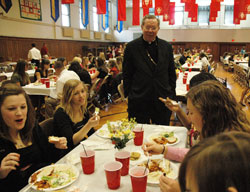Religious Education Supplement
New chastity education reaches out to parents, educators

Archbishop Daniel M. Buechlein talks with Catholic high school students during a luncheon in April honoring student leaders in the A Promise to Keep: God’s Gift of Human Sexuality program. In the archdiocesan program, Catholic high school students pledge to follow a life of chastity and share that message with students in the junior-high age group in Catholic grade schools. The archdiocese is expanding its chastity education program to involve parents and educators.
(File photo by Mary Ann Wyand)
By John Shaughnessy
Tammy Stewart was surprised by the openness that the young people showed in talking about their lives, especially the area of chastity.
As a religious education coordinator at St. Jude Parish in Indianapolis, Stewart listened intently as the youths shared the difficult challenges they face in life.
“While the kids are hearing the message that we are presenting to them through the chastity education program, response to this way of life means living counterculturally,” says Stewart, a 45-year-old mother of three. “And that is difficult for our young people, especially since some of their friends are already sexually active, or they are being approached with drugs or pornography.
“These kids need a lot of support, and they need to feel welcomed to discuss these issues with the adults in their lives without fear of being reprimanded.”
Stewart’s assessment dovetails with an increased commitment by the archdiocese this year to create a more intense and more comprehensive approach to chastity education.
The archdiocese wants to make sure that the Church’s teachings on human sexuality are interwoven into the education and faith formation programs used by parishes and schools. The new approach will provide extensive training within the parish communities to parents and educators.
“We’re asking our [staff in] parish schools and religious education programs to communicate with parents and host an annual parent program on the issue of chastity,” says Ken Ogorek, director of catechesis in the archdiocese’s Office of Catholic Education. “Parents are the primary educators of children. We want them to understand their role in chastity education, and help them fulfill that role.”
The goal is the same for classroom teachers and religious educators.
“People who address chastity-related topics in classroom settings need very specific training in this area,” Ogorek says. “We have a real specific in-service program to teach people to teach chastity education. If you have a classroom full of seventh graders and a question is raised by a student that touches upon the issue of chastity, there’s a way to deal with that question appropriately and effectively. And that’s what we want to prepare people to do.”
The increased focus on parents and educators is viewed as a complement to the archdiocese’s long-established A Promise to Keep: God’s Gift of Human Sexuality program, a peer-mentoring approach in which Catholic high school students pledge to follow a life of chastity and then are trained to share that message with students in the junior-high age group at Catholic grade schools and parish religious education programs.
“My hope is more of a team effort to helping prepare young people for a life of chastity,” Ogorek says. “When parents and teachers and peers are on the same page about the beauty of God’s gifts of love and sexuality, it’s more likely that people will live out that virtue of chastity to their great benefit.”
The expanded approach to chastity education reflects Archbishop Daniel M. Buechlein’s commitment to young people, according to Margaret Hendricks, coordinator of the A Promise to Keep chastity program.
“When we started A Promise to Keep about 15 years ago, there weren’t any dioceses doing anything about chastity education,” Hendricks says. “The archbishop has been unwavering in his support of this area from the beginning.”
Hendricks is excited about the new guidelines for chastity education, particularly the emphasis on strong parental involvement.
“Parents are so often asking, ‘How do I respond to some of their questions?’ ” Hendricks notes. “This will give them
age-appropriate education for their children. It’s about virtues and values that help them live a chaste life.”
Having parishes involved in that education is key to the new focus, says Stewart, religious education coordinator for St. Jude Parish.
“We want parents to know that as a parish we support their family and the challenges that come with living out Catholic values,” Stewart says. “Our kids need a lot of support, and parents meetings give us that opportunity to express to parents that we are here to support and affirm their family values.”
Stewart even gained a new perspective on chastity education when she received her training to lead a pilot program for parents at St. Jude Parish during the 2008-09 school year.
“Until recently, I thought chastity referred to people who did not have sex, those [who are] unmarried,” Stewart says.
“As a married person, I didn’t realize that living a chaste life also included me, and that chastity is more than sexuality. I think our young people need to hear the same message that I heard just over a year ago. Living a chaste life means that we are called to live our lives in a way that respects the dignity of the human being. We do this by acknowledging our sexuality as a gift from God, embracing God’s gifts of family, life, love and community.”
It’s a message that she shares with her children.
“As a parent, I feel it is important that I share with my kids some of the emotional, physical and spiritual reasons for living a chaste life,” Stewart says. “God doesn’t just give us rules to live by because he wants to test our obedience. God places his law in our lives out of tender care for us—to help us be emotionally, physically and spiritually healthy.”
(For more information about the archdiocese’s new chastity education program, contact Margaret Hendricks by e-mail at mhendricks@archindy.org or by phone at 317-236-1478 or 800-382-9836, ext. 1478.) †
